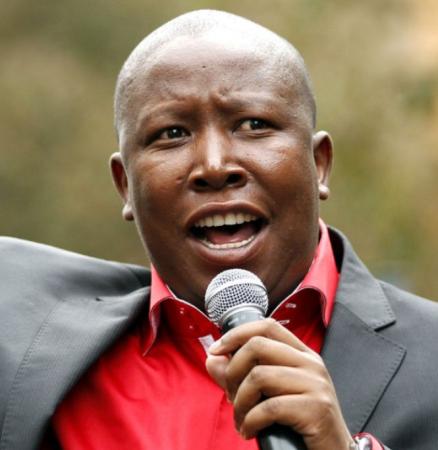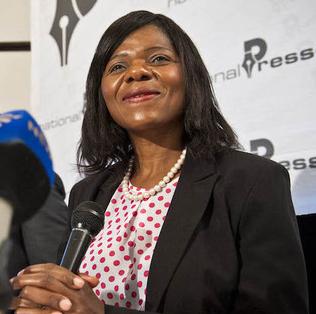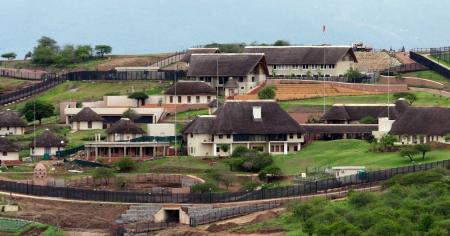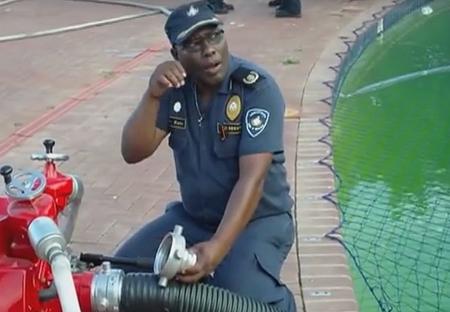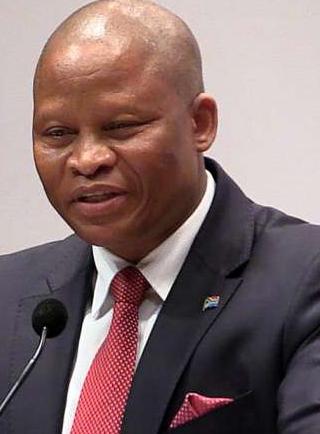Sunday April 10, 2016 - Lessons
from South Africa for Sierra Leone - Accountability, the
rule of law and the supremacy of the Constitution sees
President Zuma and Parliament slammed over corporate
deception and fraud.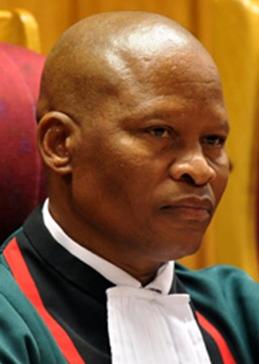 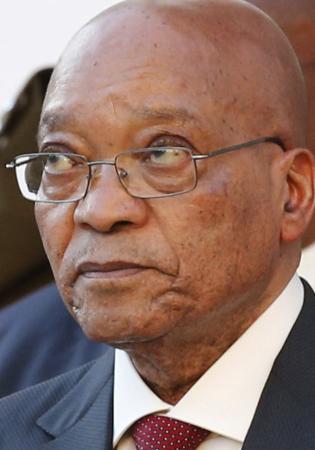 Recent events in South Africa have clearly demonstrated just what can be achieved when the tenets of democracy, the rule of law and the separation of powers are adhered to as enshrined in the Constitution. On Thursday March 31, 2016 the Constitutional Court of South Africa gave its ruling over a simmering brew of corruption charges against President Jacob Zuma with a hard-hitting judgement which clearly highlighted the efficacy and supremacy of the country's Constitution. It all started off with the opposition and the press wanting to know just how much of the peoples' money had been spent in a massive refurbishment of the residence of the President. All those who were in the camp of the President including Parliament investigated and did not find any wrong-doing on the part of President Zuma as he and his cronies insisted that the works carried out at his private residence was a security upgrade needed to keep him safe and happy and that included a swimming pool, additional ranches and a few expensive additions all carried by the tax payer, the people of South Africa. The BBC carried this bit when judgement day broke on Thursday last week - "The highest court in South Africa has ruled that President Jacob Zuma violated the constitution when he failed to repay government money spent on his private home. It gave the treasury 60 days to determine how much he should repay. The ruling is a victory for the opposition, who said they would push for Mr Zuma's impeachment. They accuse him of using "ill-gotten wealth" to upgrade his home with a swimming pool and amphitheatre." South Africa has in place an oversight body known as the Public Protector whose main function is to look at how the country's resources are spent and if anyone, including the President is found wanting order remedial action so that the peoples' resources are not wasted or stolen to satisfy personal ambitions and plans that have nothing to do with the welfare of the state and the people of South Africa. The 11-person Constitutional Court was unanimous in its decision over whether President Zuma should pay back money spent on projects that were not security-related and in no uncertain terms ruled that the President had breached the Constitution - a document that is the supreme law of the land - just as we have in Sierra Leone. It is to be recalled that even before this ruling by
the highest court of South Africa, a body that acts as
the overall Ombudsman,
the Public Protector,
Thuli Madonsela, had ruled that the President
should pay back a part of the money that was used for
the upgrade of his private residence as some of the
expenses were not security-related. President Zuma
dismissed the orders of this Constitutionally-authorised
body tagging its role as merely advisory and that its
orders had no legal weight. A committee set up also gave
credence to the President's lack of respect for the
Public Protector. What got many in South Africa alarmed
was that the South African Parliament, dominated by the
ruling African National Congress, the ANC rubbished the
findings and orders of the Public Protector insisting
that President Zuma had no business paying back and that
all the expenses were security-related including the new
swimming pool. Indeed it was quite a stunning display of
deception and crass duplicity when journalists were
invited to a charade of a show by fire fighting officers
of how the swimming pool can become a first and front
line weapon for fighting fires at President Zuma's private
residence at Nkandla. It is worth noting the basis on which the Public Protector embarked on the investigation - complaints by the public, some sections of Parliament and other sectors and all carried in local newspapers especially the Mail and Guardian and which led to these ending lines in her report Security in Comfort. "Media involvement is also an essential part of an open and transparent state. We are such as state accountability and openness form part of the founding values entrenched in section1 of our Constitution. My office has a further responsibility under section 182(4) to be accountable to all persons and communities. Again without the media, it would be impossible to comply with this injunction. “Section 195 provides for a number of important values to guide decision-makers in the context of public-sector employment. When, as in this case, a responsible functionary is enlightened of a potential irregularity, section 195 lays a compelling basis for the founding of a duty on the functionary to investigate and, if need be, to correct any unlawfulness through the appropriate avenues. This duty is founded, inter alia, in the emphasis on accountability and transparency in section 195(1)(f) and (g) and the requirement of a high standard of professional ethics in section 195(1)(a).” 3. “Public functionaries, as the arms of the state, are further vested with the responsibility, in terms of section 7(2) of the Constitution, to “respect, protect, promote and fulfill the rights in the Bill of Rights.” As bearers of this duty, and in performing their functions in the public interest, public functionaries must, where faced with an irregularity in the public administration, in the context of employment or otherwise, seek to redress it. ”
Incidentally, if the state had heeded its duty from 2009
when the media broke the story on the Nkandla Project,
it would have saved the citizens who invested trust and
taxes in the public administration millions of rand.
As a Public Protector or Ombudsman, I do not make the
rules, I simply enforce collectively agreed controls and
values that are meant to regulate the exercise of
entrusted power and resources in the state. The
Constitution says I have the power to determine right
and wrong and to take appropriate remedial action. I
have done so. Only if I was irrational can my findings
be ignored." Similarly, the Auditor-General as Guardian of Sierra Leone's Economic Security has the duty to highlight anomalies in the financial accounting and the manner in which public office holders manage the country's resources ensuring that things are done according to rules and regulations. The Office of the Auditor General is set up by Constitutional provisions and hence reports from the Auditor General are meant to be treated with the utmost concern and seriousness that is expected of a responsible and law-abiding government and governance structures. What is noticed in Sierra Leone is that most of the findings of the Auditor General are routinely ignored to the extent that the Auditor General in a recent report noted - "Section 119 of the Constitution of Sierra Leone mandates the Auditor General to audit the Public Accounts of Sierra Leone and all public offices, including the Courts, the accounts of the Central and Local Government Administration, of the university and public institutions of like nature, statutory corporation, company or other body and organisation established by an Act of Parliament or statutory instrument or otherwise set up partly or wholly out of public funds shall be audited and reported by or on behalf of the Auditor General. We are a leading agency promoting excellence and accountability in Sierra Leone and strive to be proactive in ensuring value for money for public funds. Acting in a professional, ethical and transparent manner we audit and report on the stewardship provided by the government over expenditure and all moneys received - whether from taxpayers, donors or others. Through independent professional standards-driven audits we establish to a level of audit assurance that public moneys are used by the government in the manner intended by Parliament. We assess how they are used in terms of economy, efficiency and effectiveness and the quality of reporting on these activities in terms of clarity, fairness, accuracy and transparency. We report to Parliament in the first instance but also to the citizenry of Sierra Leone and other stakeholders. Parliamentarians, Ministers and public sector managers at all levels need to provide leadership by not accepting grand or even petty corruption as normative. Those in a position to do so should expose and report corruption at every opportunity and follow the money when things go wrong. As citizens, none of us should ever accept fiduciary irresponsibility from those charged with holding the strings of the public purse. To do so is morally corrosive, erodes our civic rights and damages our hard-won young democracy. Citizens have power as was demonstrated when my report on the Management of Ebola Funds was published earlier this year. The findings, widely publicized in the global media and through public hearings of PAC proceedings, engaged and enraged the people and, for the first time in Sierra Leone, a parliamentary committee brought public officials to book and levied serious sanctions." The Constitutional Court ruling in South Africa shows
that bodies set up by Acts of Parliament do have
authority to act on behalf of citizens and to bring to
the fore reports and concerns of the public when it
comes to matters affecting the governed.
The ruling lambasted Parliament and the Committee set up to look into the Public Protectors report for their dare in stating that the security upgrades were in order and that President Zuma was not in any way required to pay back a part of the money spent on upgrading his private residence. Faced with the unanimous decision of the 11-person Constitutional Court, the arrogance of President Zuma took a heavy blow, saw how wrong he'd been in trying to ignore the findings of the Public Protector and in a speech on April 1, 2016 admitted that he was in the wrong. "We have well-established institutions that support democracy and which protect the rights of our citizens. These include the Chapter 9 institutions, the Office of the Public Protector, the South African Human Rights Commission, the Office of the Auditor-General, the Commission for the Promotion and Protection of the Rights of Cultural, Religious and Linguistic Communities and the Commission for Gender Equality. Our Constitution also establishes a democratic parliament. I respect the role of parliament to hold the Executive to account as true representatives of our people, representing, as it does different voices, views and constituencies. Guided by the Constitution, we have an independent judiciary which is a trusted final arbiter in disputes in society. Yesterday, the Constitutional Court of the Republic, playing this crucial role, issued a judgement on the matter of security upgrades at my private residence in Nkandla. I welcome the judgement of the Constitutional Court
unreservedly.
The judgement has underscored the values that underpin our hard-won freedom and democracy, such as the rule of law and the accountability of public office bearers, while also respecting the rights of public office bearers facing scrutiny. The judgement has further strengthened our constitutional democracy and should make South Africans proud of their country’s Constitution and its strong and effective institutions. This is a ground-breaking judgement with regards to the powers of the Public Protector. I wish to thank the Court for providing clarity which will have a positive impact on other Chapter 9 institutions as well with regards to their work. The Constitutional Court has ruled that the remedial actions of the Public Protector are binding, and that anyone wishing to challenge the remedial action can only do so through a review by a court of law. The Court has also ruled that the remedial actions with regards to six features of the Nkandla project must be carried out. This entails the National Treasury establishing a reasonable proportion of the reasonable costs of each item to be paid by the President. I respect the judgement and will abide by it." This is what an independent Judiciary is supposed to be doing in ensuring that the rule of law and accountability are respected in the furtherance of democratic principles as enshrined in the highest law of the land - the Constitution. In Sierra Leone, findings of the Auditor General are treated with levity by both the Judiciary and Parliament and even though quite clearly public documents, are not acted upon by the Anti Corruption Commission, a Constitutional body. The open battle between the Majority Leader in Parliament one RASS-in Bundu and Anti Corruption Chief Joseph Fitzgerald Kamara is a shameful episode that has shown that both bodies are more interested in protecting the Executive and looters of state funds than abiding by their duties as enshrined in Sierra Leone's Constitution - the supreme law of the land. One news outlet had this - "In her report in 2014 titled "Secure in Comfort", Madonsela said some features included in the R246-million security upgrades to Zuma's Nkandla residence were not security features. These included a cattle kraal, chicken run, visitors' centre and pool. But Zuma did not ‘pay back the money’, instead he prevaricated and eventually referred the matter to his police minister, Nathi Nhleko, who conducted his own inquiry to establish whether he owed anything. Nhleko produced a report which found he did not owe a cent, which was adopted by parliament after a fractuous debate. By then parliament had been brought to a standstill on several occasions by the EFF. The EFF took the matter to the constitutional court. In February the justices of the court heard argument in the matter. Zuma’s counsel, Jeremy Gauntlett SC, surprised all when he abandoned Zuma’s dogged defiance and said the president wanted to bring it to a close. Gauntlett refered to the finding by the Supreme Court of Appeal that remedial action prescribed by the public protector was binding. “It is not necessary for this court to re-plough the
furrow," he said.
Parliament was shown up during the hearing for its
finding that Zuma did not owe money.
Advocate Lindi Nkosi-Thomas, appearing for the Speaker
of the National Assembly, argued: "The public protector
cannot dictate to parliament what to do." Counsel for the EFF, Wim Trengove SC, asked the court to go ahead and make a finding on the matter despite Gauntlett’s concession that Zuma had to pay back the money. "As far as the president is concerned, he has violated his duty to assist the public protector. This means the president has violated his duty to uphold his office. He has, for nearly two years, defied the public protector," Constitutional law expert Pierre de Vos said of Gauntlett’s concession: "The president obviously threw parliament under the bus ... it was impossible, after the president conceded, for the representative of parliament to come with a sound argument." In Sierra Leone only a handful of news outlets dared carry the story of these historic events in South Africa. Those feeding fat from the droppings of the rat at State House fear that carrying the story would once again focus the attention of people on the Supreme Court ruling that the rat had the right to sack the Vice President, a person who was elected into office as per the Constitution even though there are clear provisions as to the circumstances and procedures that can lead to a Vice President losing his/her job. This was brushed aside by the compromised Supreme Court thus given legal credence to what was quite clearly a violation of the Constitution of Sierra Leone. The Sierra Leone Telegraph stands above them all as it reported and gave this preamble to its report on events in South Africa and lessons for Sierra Leone. "Political developments in Sierra Leone may be troubling, but do not come as a surprise to those who understand the post-colonial politics of the country. Yet, expectations of a better way of doing politics – based on respect for the rule of law and constitutionality by a generation of younger politicians – including the president and those occupying the highest offices in the country are high. But time and again, as recent political events have shown in Sierra Leone, the continuous erosion – or as many would say – substitution of the rule of law with so called presidential executive decisions or ‘orders from above’, is slowly diminishing any hope of a strong and independent judiciary, and unfettered guarantee of democratic freedoms. Speak to supporters of president Koroma and members of the ruling APC party, whose political ideology is based on the idea of an all powerful, authoritarian and revered president, you get a sense of a presidential authority emanating not from the country’s constitution and laws of the land, but from the whims and caprices of those occupying State House and their cronies. President Koroma’s sacking of the country’s vice president without recourse to the Constitution, was shockingly upheld by the highest court in the land – the Supreme Court. The frequent bye-passing of parliament by ministers in their decision to borrow and spend millions of dollars on unapproved projects, and without following established procurement rules, are authorised and sanctioned by so called executive ‘orders from above’ – the president."
|


